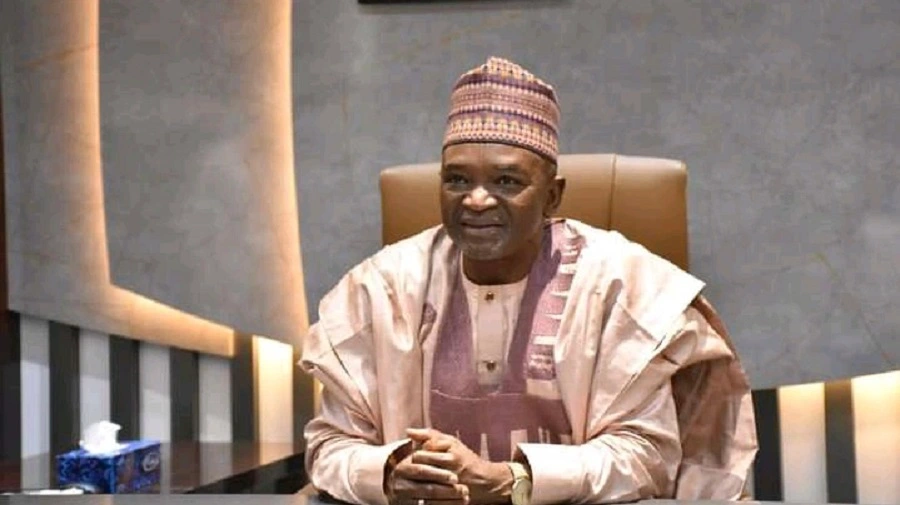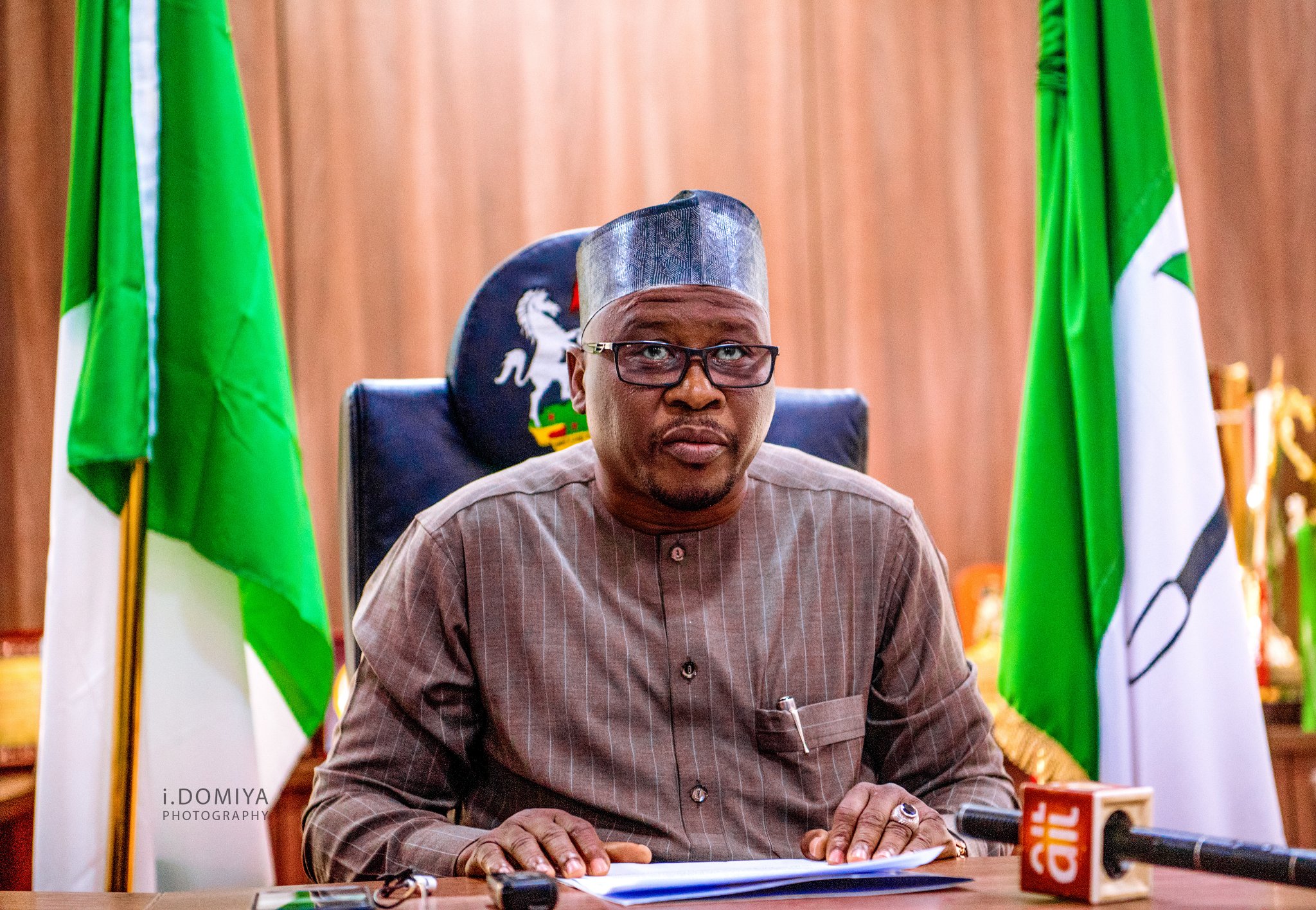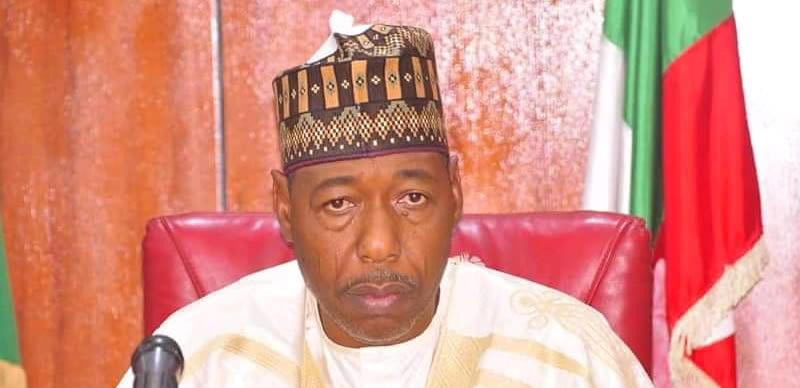Agriculture
Terrorism Didn’t Really Disrupt Food Production, FG Says

Nigeria’s Federal Government has disclosed that acts of terrorism in the northern part of the country did not significantly cause a drop in agricultural production.
Minister of Agriculture and Rural Development, Mohammed Abubakar, who made this known Thursday at a news briefing at the State House, Abuja, also said about 3.6 million indirect jobs have been created from $2.4 billion worth of externally funded projects being implemented by the present administration.
related_post_wrapper left”
Answering a question on reported inability of farmers in the northern part of the country to access to farms, the Minister said though the federal government is concerned about the development, however, assured that it had not significantly hampered food production.
He said: “About farmers not being able to access their farms in the northeast, northwest and northcentral. Yes, it’s a concern for the government. However, if you notice, our production still has not dropped to any significant level that will say it has dropped and it’s one of the reasons why also we have this arrangement for the agro-rangers to provide some measure of security to be able to access the farms.
“Truly yes, if you cannot complete access farms all over, you will expect a drop in the production, but right now, we are doing everything possible to make sure we maintain through that security provision and other things that we may not necessarily mentioned, but you can see food still being produced for the most part”.
On the gains being derived from internationally funded projects, Abubakar said $538 million was approved for special agricultural processing zones to support inclusive and sustainable agricultural development in Nigeria.
According to him, another project worth $575 million is being implemented to improve rural access and agricultural marketing in participating states while strengthening the financing institutional base for effective development, maintenance and management of rural roads network.
He listed the participating states to include Akwa Ibom, Bauchi, Kano, Katsina, Kogi, Kwara, Kebbi, Ogun, Ondo, Oyo, Plateau and Sokoto.
The Minister noted that government is also implementing the Value Chain Development Programme Additional Financing (VCDP-AF) 2020- 2024 to enhance, on a sustainable basis, incomes and food security of poor rural households engaged in the production, processing and marketing of rice and cassava.
He revealed that the project is currently being implemented in nine states including Niger, Benue, Ogun, Ebonyi, Taraba and Anambra, Nasarawa, Kogi and Enugu “to scale up the achievement recorded in the original VCDP states.”
Abubakar said Agro-Climatic Resilience in Semi-Arid Landscapes Project (ACReSAL, a $700 million project, is being implemented by three ministries; Environment, Agriculture, and Water Resources with thr 19 Northern states and the Federal Capital Territory (FCT) being the beneficiaries.
“The project objective is to mitigate and build the resilience of Nigerian farmers to climate change. The project duration is six years -2022 to 2028. Over One million degraded land will be restored within the six years project cycle,” he stated.
Another project being funded externally is Climate Change Adaptation and Agro-business Support Project (CASP), which the Minister explained is to increase incomes, enhance food security and reduce vulnerability for smallholder farmers particularly women and youths in the participating States Katsina, Jigawa, Yobe, Borno, Sokoto, Kebbi and Zamfara.
The cost of the project is $87 million and was designed for 2015 – 2021 but extended to March, 2022.
The World Bank/Federal Government of Nigeria Livestock Productivity and Resilience Support Project (L-PRES) is being implemented at the cost of $500 million.
The Minister explained that it is an initiative, which adopts a Community Driven Development (CDD) approach targeted at promoting smallholder resilience and commercialization by facilitating linkages and private sector investment in selected value-chains in the Livestock sub-sector.
On speculations of soaring food prices despite these spirited interventions of government, Abubakar said they were not peculiar challenges to Nigeria, rather it was a reflection of global economic value chain system.
According to the Minister, Nigeria being part of the international community is exploring ways to manage the situation to suit its own peculiarities as a nation.
“We released about 70,000MT(2,333) trucks of Assorted Food Commodities (AFC) approved by Mr. President to cushion the effect of COVID-19 pandemic, in 2020 to the vulnerable populace in the 36 States and FCT.
“This was followed by the release of 5,000MT of maize to Poultry Association of Nigeria (PAN) to stabilize the hike in price of maize in the open market and to ensure that PAN members remain in business, in 2020. Then there was also emergency release of 1,480MT of assorted food commodities to support IDPs in Kaduna and Katsina states in 2020.
“Currently releasing 40,000MT of assorted food commodities approved by Mr. President to the vulnerable populace, IDPs through Federal Ministry of Humanitarian Affairs, Disaster Management and Social Development, Religious Bodies and Poultry Association of Nigeria (PAN) to cushion the effect of high price of food commodities, currently, the National Food Stock balance is 60,000MT of Assorted Food Commodities after the releases”.
Commenting on the impact of the war between Ukraine and Russia, the Minister noted that even though COVID-19, and insecurity in some parts of the country are posing threats to the agricultural sector, the short-term mitigation measures and medium-term plans of the government are yielding the desired results.
He explained that FMARD is adopting a multi-stakeholder approach in designing and implementing its mandate; with enhanced private sector involvement in agriculture and sustained efforts to reduce drudgery and enhance value addition. Nigeria can deepen the production of its basic food requirements and create more jobs in the process.
“The success of any agricultural policy and interventions, however, rests on synergy among federal MDAs, and between federal, states and Local governments.
“Nigeria is not immune from the current situation in Europe. It is my hope that the recent agreement between UN, Turkey Russia, and Ukraine on the export of grains through the Black Sea Ports of Ukraine will lead to a drop in the price of grains in the international market, which will in turn ease the inflationary trend on the price of food in the country”, he noted.
The Minister also explained that about $35million dollars is being expected from the Mexican government from export of hibiscus flower used in zobo production.
He said under Rural Infrastructure Development, the ministry constructed 765.36 Km of Asphalt roads and 7.75km of Earth Roads, leading to 22,961 direct jobs and 765,360 indirect Jobs being created.
According to Abubukar, government also provided 635 units of Motorized/ Solar powered boreholes and 25 Nos Hand pump, leading to 13,585 direct jobs and 96,750 indirect jobs being created, Provided 15 Nos Water treatment plants leading to 315 direct jobs and 2,250 indirect jobs being created.
It “installed 17,099 units of all-in-one Solar Streetlight, leading to 7,980 direct jobs and 113,993 indirect jobs being created;
constructed 15Nos Block of 3 Classroom with 480 direct jobs being created
Constructed/rehabilitated Town Halls, School Clinic, School perimeter fencing, School Dining Hall, ICT centres, installed 6 Nos electricity transformers.”
Agriculture
Fintiri Unleashes N2bn Boost for Farmers as Adamawa Rolls Out 2025 Agricultural Support Programme

The Adamawa State Government has launched the 2025 Agricultural Support Programme aimed at empowering smallholder farmers and enhancing food security across the state.
Commissioner for Agriculture, Prof. David Jatau, disclosed this on Friday while briefing journalists in Yola. He revealed that Governor Ahmadu Umaru Fintiri had approved a substantial N2 billion for the initiative, which targets increased agricultural productivity in the upcoming farming season.
According to Jatau, the programme—which is already underway—will provide subsidised agricultural inputs such as fertilisers, improved seeds, and other essential materials to farmers in six local government areas.
“The programme has already commenced in six LGAs—Madagali, Michika, Hong, Maiha, Demsa, and Ganye,” he said. “By next year, during the rainy season, we will extend the programme to the remaining LGAs.”
He explained that 300 hectares of farmland would be cultivated in each of the participating local governments, with 300 farmers benefitting per council.
To ensure fairness and transparency, Jatau said a multi-stakeholder committee had been constituted to oversee the beneficiary selection process. The committee comprises representatives of traditional councils, local government authorities, security agencies, youth groups, and women organisations.
“We are also equipping extension workers with training to offer farmers guidance on modern agricultural techniques for improved yield,” he added.
The commissioner noted that the intervention would not only increase food production but also generate employment, improve rural incomes, and contribute to economic stability in farming communities.
Jatau also revealed that the state government is collaborating with non-governmental organisations and agricultural development bodies, with over 2,700 hectares of farmland pledged by development partners for cultivation.
He reaffirmed the Fintiri administration’s commitment to achieving food self-sufficiency and urged beneficiaries to make the most of the programme.
Agriculture
KWASU Microfinance Bank disburses loan to farmers

The Kwara State University (KWASU) Microfinance Bank has provided loan facilities to farmer groups in and around Malete, Moro Local Government Area.
The Vice-Chancellor and Chairman of the Board of Trustees, KWASU Microfinance Bank, Prof. Jimoh Shaykh-Luqman, announced this while presenting offer letters to the farmers’ associations at a formal event held on the university campus.
Addressing the farmers, the Vice-Chancellor, represented by the Deputy Vice-Chancellor (Administration), Prof. Moshood Jimba, said the agricultural loan scheme aimed to support farmers in boosting food production and enhancing food sustainability.
“The loan is meant to support your farm operations, especially in the upcoming planting season,” he said.
Prof. Shaykh-Luqman reaffirmed KWASU’s commitment to its mantra of being a “University for Community Development,” leveraging its expertise and resources to initiate programmes that drive local development.
The Managing Director and Chief Executive Officer of KWASU Microfinance Bank, Alhaji Hakeem Hassan, noted that the agricultural loan scheme was piloted last year with 15 farmers as beneficiaries.
He added that the pilot scheme yielded positive results for both the farmers and the bank, as all beneficiaries successfully repaid their loans.
Following this success, he said, the scheme had been expanded to include more farmers under various farmers’ associations.
The News Agency of Nigeria (NAN) reports that the associations benefiting from the agricultural loan scheme include Alanu Agbelere Farmers Group, Agbedola Ketere Group, and Itesiwaju Agbe Group Omoni.
Others are Agbeloba Farmers Association (Malete Market), Agbeyewa Elemere Farmers Group, Agbe Olofeere Group, and Agbeloga Malete Farmers Group.
Speaking on behalf of the farmers, the Chairman of Agbeloba Farmers Association (Malete Market), Alhaji Mohammed Abdulrazaq, expressed gratitude to the university and the bank for their trust.
He pledged, on behalf of the beneficiaries, to utilise the loans effectively and ensure prompt repayment.
Agriculture
Kano Govt. implements N2.3bn livestock empowerment programme

The Kano State Government has begun implementing the second phase of its livestock empowerment programme valued at N2.3bn under the Kano State Agro-Pastoral Development Project (KSADP).
The Commissioner for Agriculture and Natural Resources, Dr Mamood Danjuma, disclosed this while addressing newsmen on Thursday in Kano.
Danjuma said the initiative aims to support beneficiaries with livestock, feeds, drugs, and salt lick to enhance their economic well-being.
According to him, 911 beneficiaries are being supported with two rams each, feed for three months, drugs and salt lick, while 2,386 women are being supported with two goats and a buck goat in the poorest households in the state.
He explained that the total package under the empowerment programme showed that 1,342 bulls were procured by the government at the cost of N560m, 1,822 rams were procured at the cost of N175m and 7,158 goats bought at the cost of N451m.
“Under the cattle scheme, each cattle gains 100kg over a period of 120 days. The fattening period is for 120 days, making three cycles possible in a year.
“As for the small ruminants fattening scheme, with the same 120-day fattening period yielding an extra 15kg/animal.
“The project promotes goats’ reproduction through women who will take care of the animals and sell the young ones to improve their income and standard of living,” he said.
He said that the programme promotes economic empowerment, particularly among women, by providing them with livestock to care for and sell, ultimately improving their income and standard of living.
-

 Headlines4 years ago
Headlines4 years agoFacebook, Instagram Temporarily Allow Posts on Ukraine War Calling for Violence Against Invading Russians or Putin’s Death
-

 Headlines4 years ago
Headlines4 years agoNigeria, Other West African Countries Facing Worst Food Crisis in 10 Years, Aid Groups Say
-

 Foreign4 years ago
Foreign4 years agoNew York Consulate installs machines for 10-year passport
-

 News1 year ago
News1 year agoZero Trust Architecture in a Remote World: Securing the New Normal
-

 Entertainment3 years ago
Entertainment3 years agoPhyna emerges winner of Big Brother Naija Season 7
-

 Headlines2 years ago
Headlines2 years agoNigeria Customs modernisation project to check extortion of traders
-

 Entertainment2 years ago
Entertainment2 years agoMovie download platform, Netnaija, announces closure
-

 Economy2 years ago
Economy2 years agoWe generated N30.2 bn revenue in three months – Kano NCS Comptroller















